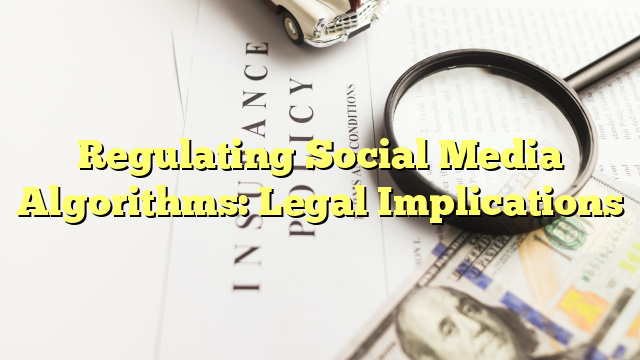Table of Contents
- What is the issue with social media algorithms?
- What are laws and regulations on algorithms?
- Why are algorithms a drawback for social media users?
- How to control social media algorithm?
As social media usage and impact become more widespread, there is an increased need to regulate the algorithms used by such platforms. Algorithms are a set of instructions that are used to process data, and on social media, they are used to aid in the decision-making process of what content a user may be exposed to. This article will discuss the legal implications of regulating social media algorithms, outlining the issues with such algorithms, what laws and regulations are currently in place, and the drawbacks for social media users. Further, this article will propose ways to control social media algorithms in order to protect user privacy and ensure that these platforms are regulated in an effective manner.
What is the issue with social media algorithms?
The issue with social media algorithms is that they can be used to manipulate users. Algorithms can be used to showcase content to users that is tailored to their specific interests. This can lead to users being shown biased or misleading information, or being exposed to content that may not be suitable for them. Additionally, algorithms can be used to target users with specific advertisements, leading to users being exposed to advertisements that may not be relevant to them or that could be potentially harmful. This can lead to users being exposed to content that is not safe or that could have a negative impact on their mental and physical health.
What are laws and regulations on algorithms?
Currently, there are few laws and regulations in place to regulate social media algorithms. The General Data Protection Regulation (GDPR) in the European Union is one of the few laws that specifically addresses the issue of algorithmic regulation. The GDPR requires companies to provide users with information on how their data is used and stored, and it also requires companies to provide users with the right to access and delete their data. Additionally, the GDPR mandates that companies must take steps to ensure that algorithms are not used to discriminate against users.
In the United States, the Federal Trade Commission (FTC) has taken steps to regulate social media algorithms. In 2018, the FTC released a report on algorithmic transparency and accountability that outlined guidelines for companies to ensure that their algorithms are fair and transparent. This report also outlined ways for companies to ensure that algorithms are used responsibly. The FTC has also taken steps to ensure that algorithms are not used to target users with advertisements or content that could be potentially harmful or misleading.
Why are algorithms a drawback for social media users?
Algorithms have many drawbacks for social media users. One of the main drawbacks is that algorithms can be used to manipulate users. Algorithms can be used to target users with specific content, ads, or recommendations, which can lead to users being exposed to information that is not relevant or that could be potentially harmful. Additionally, algorithms can be used to target users with content that is biased or misleading. This can lead to users being exposed to information that is not factual or accurate.
Another drawback is that algorithms can lead to a decrease in user privacy. Algorithms can be used to track user behavior and to collect data about them. This data can then be used to target users with specific advertisements or content. This can lead to users feeling as though their privacy is being violated, as their data is being collected and used without their consent or knowledge.
How to control social media algorithm?
There are several steps that can be taken in order to control social media algorithms. One way to do this is to ensure that algorithms are transparent. Companies should provide users with information on how their data is used and stored, and they should also provide users with the right to access and delete their data. Additionally, companies should ensure that algorithms are not used to target users with content that is biased or misleading.
Another way to control social media algorithms is to ensure that user privacy is protected. Companies should

